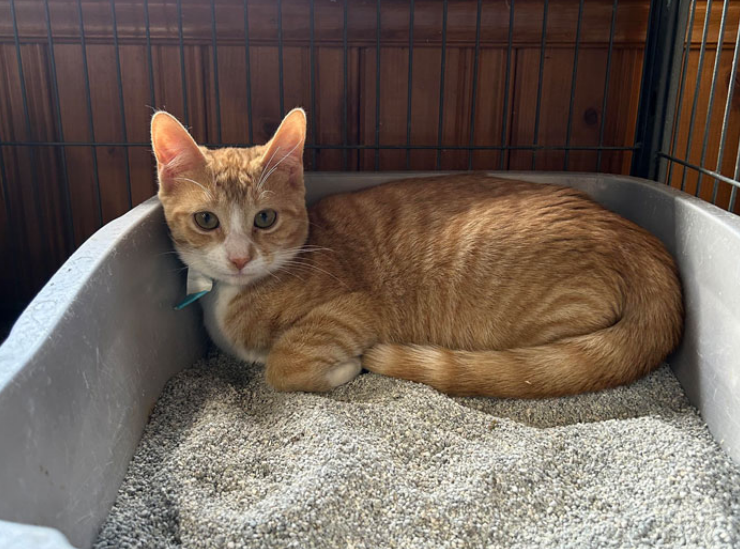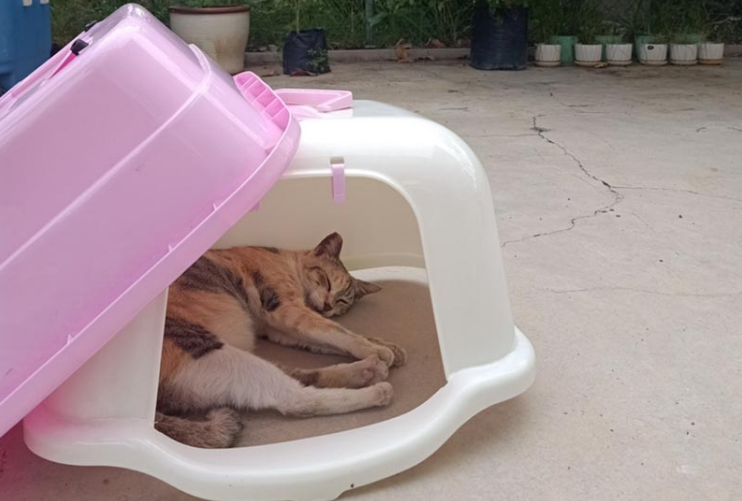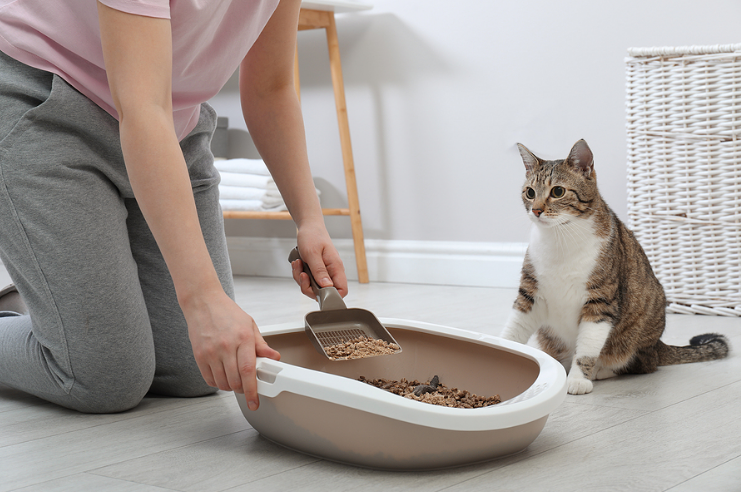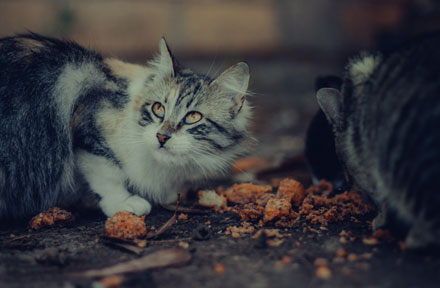Mar 19, 2025
Author:Sam Wonder

Owners can usually notice their cats doing something strange. A behavior that can be puzzling to cats' guardians, is when cats lay down or sit in their litter box when they have no immediate need to relieve themselves.
This may just be an unusual quirk, but it also may be an indication of a deeper problem. Here are some reasons cat owners might be alarmed if their cat is lying in the litter box: It could get messy; It could mean health complications if the cat is soiling itself; It can speak towards territorial behaviors; Perhaps your cat might be having some stress or anxiety.
In this article, we will explore more about why your cat may be doing this when it might mean something more serious, and solutions to keep your cat from lying in its litter box when you don’t want it to.
A cat laying in its litter box every so often is not cause for concern, but frequent laying in the litter box, particularly when coupled with other behavioral changes, can indicate a problem. There are some exceptions where this behavior may be more common to find:
● Initial training kittens when they get familiar with a Litter Box
● Cats not accustomed to their new home after being rescued from a shelter
Except for these scenarios, a cat lying often in a dirty litter box may be a sign of discomfort, sickness, or being threatened by its environment or other furry pals. Keeping track of whether this is happening consistently as opposed to random laying will be helpful in identifying if intervention is necessary.

There are a number of explanations for why a cat may insist on laying in its litter box for long periods. Here are some of the most common causes behind this behavior:
All Cats are known to experience huge stress in situations that often do not rattle other pets, such as dogs. Such situations include moving houses, introducing new people or pets, loud noises, general remodeling, or changing how things are done every day.
A litter box is an enclosed space that might be perceived as safe and comforting, like hiding under the bed.
Signs of anxiety or stress can go beyond just laying in a litter box and may include changes in eating patterns, aggression, more frequent hiding, or excess grooming behaviors.
If that box seemed like a safe retreat during times of stress, it would help understand the repetitive behaviors, thus further laying.
Various medical conditions could be affecting your cat, causing pain or discomfort that would drive her to spend long periods in the litter box.
Here are some potential medical options:
● One of the more common causes of this is urinary tract infections. Because the associated pain may cause the cat to frequently feel the need to urinate, she will sometimes relate the box with an urge to rise and lay down again.
● Others include bladder stones or blockages: One very serious condition in male cats is the development of bladder stones or renal blockages that prevent urination completely.
● Symptoms may progress rapidly from one discomfort to lethargy, inappetence, crying, and hunched posture over the litter box.
● Other illnesses could include kidney disease, diabetes, hyperthyroidism, cancer, arthritis, and cognitive dysfunction.
The litter box location is a territorial marker for cats. Competition could arise between multiple cats for access to prime resources: choice napping spots, food bowls, human attention, and litter boxes. A dominant or territorial display would be when a cat claims a litter box by lying in it for an extended period of time.
Other signs a cat could be guarding the litter box include ambushing another cat entering the box, choosing to leave waste or urine uncovered, perching near the box, and staring down other pets approaching the area. Correcting the tension between cats in the house is one way to deal with litter box problems.
When cats near the end of pregnancy as they prepare for birth, nesting behaviors and seeking secluded spaces are common. The enclosed space and texture of litter may appeal to a pregnant cat when other soft bedding spots feel exposed.
Signs a cat is nearing labor include nesting activities, shifts in appetite, swollen or leaking nipples, clinginess, and enlargement around the belly. If a pregnant cat spends increasing time lying in the litter it likely indicates kittens are coming soon. Keep her comfortable in a low-traffic area when the anticipated birth approaches.
Some cats simply enjoy lounging in litter boxes, especially uncovered boxes with loose litter reminiscent of sand. An open box with fine-grained litter can mimic a comfortable nest-like spot.
The environment may also play a role – cats disliking noise, other pets, or household activities may find the enclosed hidden spot of a litter box comforting. Insufficient warm, soft bedding spots, changes in shelter routines, or introducing outdoor cats to an indoor environment can also lead them to lay in litter seeking warmth and security.
Cats adopted as strays or from shelters tend to undergo immense stress adjusting to new environments with new people, pets, noises, and restrictions they find frightening. Their litter box often serves as a familiar object providing a sense of security.
Fearful or poorly socialized cats may take weeks to months before feeling fully secure integrating into a home. Patience, maintaining routines, designating safe spaces, and slow introductions can help shelter cats feel safe. However, spending extensive time hiding or laying in the litter may continue during initial adjustments.

If your cat is persisting in laying in its litter box often, here are some steps to identify why and resolve the behavior:
If you suspect your cat is laying litter behaviorally, begin by closely tracking your cat day-to-day to identify any correlations between the litter-laying behavior and potential triggers such as the introduction of a new pet, moving furniture around, nearby construction noise, diet changes, etc.
Note also for other behavioral changes which may accompany these changes such as aggression or desire for solitude, eating/drinking/urinating or defecating more or less, vomiting, or signs of pain that may signify sickness. Tracking litter laying (both by time of day and frequency) will highlight patterns, and if any environmental factors cause litter laying, that should emerge from the ongoing documentation.
Treating any underlying medical issues contributing to litter box laying is essential before behavioral correction can happen. So veterinary oversight helps clarify if any discomfort, infections, or other diagnosable conditions could be at play.
If medical issues are ruled out, focus on environmental modifications and tools to de-stress your cat. Is noise an issue? Try sound machines or music to muffle triggering sounds. Is a new pet intimidating your cat? Reintroduce them slowly providing ample hiding spots. Have changes like moving stressed your cat? Maintain their routine of feeding, playing, and sleeping spots.
You can also encourage the use of other safe spaces like enclosed beds, cardboard boxes, interior closets, etc. Consider calming aids like Feliway pheromone diffusers, calming treats, or toys like treat balls to build confidence in combatting stressors.
Ensure you have clean, easily accessed litter boxes. Scoop waste at least twice daily; replace litter weekly. Have at least one box per cat plus one extra.
Evaluate litter box size, type of litter used, liner preferences, and location. Your cat may prefer finer vs coarser litter, uncovered vs covered boxes, liner vs no liner, or a quieter less-trafficked spot. Doing trials with different setups can indicate your cat’s preferences.
If your cat has been spending too much time in the litter box, then addressing any potential sources of stress and creating a comfy, well-balanced environment can go a long way. One often-overlooked element in the equation is their feeding schedule. Others might have an insecure meal approach, making them look for secluded or comfortable areas — such as the litter box — to calm down.
A consistent feeding schedule with a specific feeding spot can help as well. A rigid schedule through an automatic feeder, such as the WOpet Heritage View Pet Feeder, means your cat will be fed at the same times and can avoid anxiety due to the predictability and certainty of a set routine. And by keeping their food and water in a calm separate area—so never in the same place as the litter box—you can avoid territorial behavior and provide a healthier routine.
Fine-tuning something as basic as feeding and finding safe resting spots for your cat, can go a long way in helping him/her feel comfortable and breaking bad habits to make sure they flourish in a stress-free home.
For multi-cat tension, adding more litter boxes in different rooms provides options. Designate food bowls and key sleeping areas for each cat. Target the aggressor cat showing territorial behavior for behavioral modification – try anxiety-reducing pheromones and toys rewarding gentle play and confidence building.
If you need to re-introduce cats, do gradual site swaps of scent and space before fully reuniting. It also helps identify any resources causing competition to better manage sharing.
Cats lying in litter boxes may seem confusing and concerning to owners initially. But in many cases, it goes away on its own or has a recognizable trigger, such as a new pet causing them stress.
The trick is distinguishing typical adjustment behavior from more concerning signs of illness, anxiety, or territorial challenges that require intervention. You'll be in a better position to react constructively to unwanted litter-laying habits when you understand their motivations and environment.
Don’t be afraid to enlist veterinary guidance to assess for health issues or behaviorist support if litter box behaviors continue despite your best efforts.
Label:
Popular Post

What to Feed a Sick Dog With No Appetite? [2025 Guide]
May 16, 2023

Troubleshooting Common Issues with Automatic Pet Feeders: Tips & Tricks for Pet Owners
Oct 26, 2023

Why Does My Cat Cough After Drinking Water? 8 Potential Reasons
Mar 13, 2023

Why is My Cat Throwing up Water? Top 5 Causes Here
Feb 08, 2023

My Cat Only Eats A Little at A Time - What to Do?
Feb 27, 2023
$99.99
$129.99
Copyright © 2025 WOPET. All Rights Reserved.